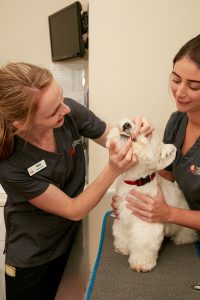Ash Wachman
Caring and open, I wouldn’t want to trust my dog with anyone else.
It’s important to remember that it’s just important for your pet to visit the dentist as you! Pet dental health is crucial for quality of life. By bringing your pet to the Ark for their comprehensive oral health assessment and treatment, you can ensure that they will be treated by nurses and veterinarians specially trained in veterinary care. Using human-grade dental equipment, we can carry out a range of procedures that will reduce your pet’s discomfort and help prevent smelly breath.
It all starts with your FREE dental health check with one of our highly trained Veterinary Nurses. We recommend checking your pet’s oral health every 6 months.
To book a FREE dental health check appointment please call the Ark at

There are a few things that make up dental disease in dogs and cats. The most common ones are plaque and tartar buildup.
Plaque forms on the teeth as a mixture of saliva, food, and bacteria, which then hardens and continues to build, eventually leading to calculus, otherwise known as tartar. This is the dark, concrete-like layer you may see on your pet’s teeth, mostly near their gum line.
Gingivitis is also commonly seen in animals. It is an inflammatory response to bacterial biofilm that covers the teeth and gums.
The infiltration of the tissues surrounding the teeth by these inflammatory cells cause the angry, uncomfortable red line we often see where the tooth meets the gum.
As gingivitis progresses tooth root exposure can occur which can be very painful. As the gum line recedes due to inflammation and infection, the root of the tooth becomes exposed and pockets form where food and other debris can hide, worsening the situation.
It is not uncommon for the teeth and gums to look relatively normal, however, once dental radiographs are performed we are able to see the extent of disease under the gum line.
This is why we recommend a Comprehensive Oral Health Assessment and Treatment (COHAT) under general anaesthesia.
In addition, cats often develop resorptive lesions (previously these were called feline odontoclastic restorative lesions (FORL)).
These incredibly painful lesions occur in more than 50% of adult cats and unfortunately cannot be prevented or reversed but we can treat them.
A resorptive lesion occurs when the bony substance covering the entire tooth from crown to root called dentin, erodes. This essentially exposes the root canal containing blood vessels, lymphatic vessels, and nerves. The lesions are often very painful.
Where resorptive lesions are present, it is recommended the tooth be extracted.
There are a few signs you can keep an eye out for with your pet that point towards dental disease.
Whilst our vets check your pet’s teeth at every annual health check and vaccination, if, at any point you are concerned, one of our veterinary nurses can perform a complimentary dental check.
The most common signs of poor oral health include:
– Bad breath
– Showing interest in food but not eating
– Chewing on one side of their mouth only
– Blood in their water or food bowl
– Swollen sides of the face
– Pawing at the mouth
– Reduced or abnormal grooming habits
– Chattering teeth
There are several ways you can minimise the development of dental disease in your pet.
Here at the Ark Veterinary Hospital, we recommend a two-pronged approach: active maintenance and passive maintenance.
Active maintenance is when we clean our cat or dog’s teeth using a toothbrush and specially formulated animal toothpaste. This is the best method to prevent oral disease.
Avoid using human toothpaste as this can aggravate their mouths and burn. Pet-friendly toothpaste comes in delicious pet-friendly flavours like chicken or beef.
Use any small toothbrush that easily fits inside your pet’s mouth.
Teeth brushing ideally needs to be performed daily. Take it slow in the beginning to get your pet used to it. With some positive training and rewards the process can become very enjoyable and your pet will love you for it!
Passive maintenance utilises diets, treats, and additives that assist in slowing the progression of dental disease.
Ark Vets recommend products that have the VOHC seal of approval (Veterinary Oral Health Council quality assurance program).
There are many other oral hygiene products on the market, please ask our vets what they recommend.
For some animals, it is difficult to implement any treatments like those above at home. They may be older with fewer teeth to chew, or picky eaters. In these cases, it is best to have regular check-ups and dental work under general anaesthesia. This is perfectly safe to be done on an annual basis and means we can keep a close eye on your animal’s condition and document any changes we see along the way.
If you’d like to know more about your animal’s oral health, give us a call on 02 9416 1300 to make an appointment with one of our Veterinary Nurses for a complimentary dental health check.